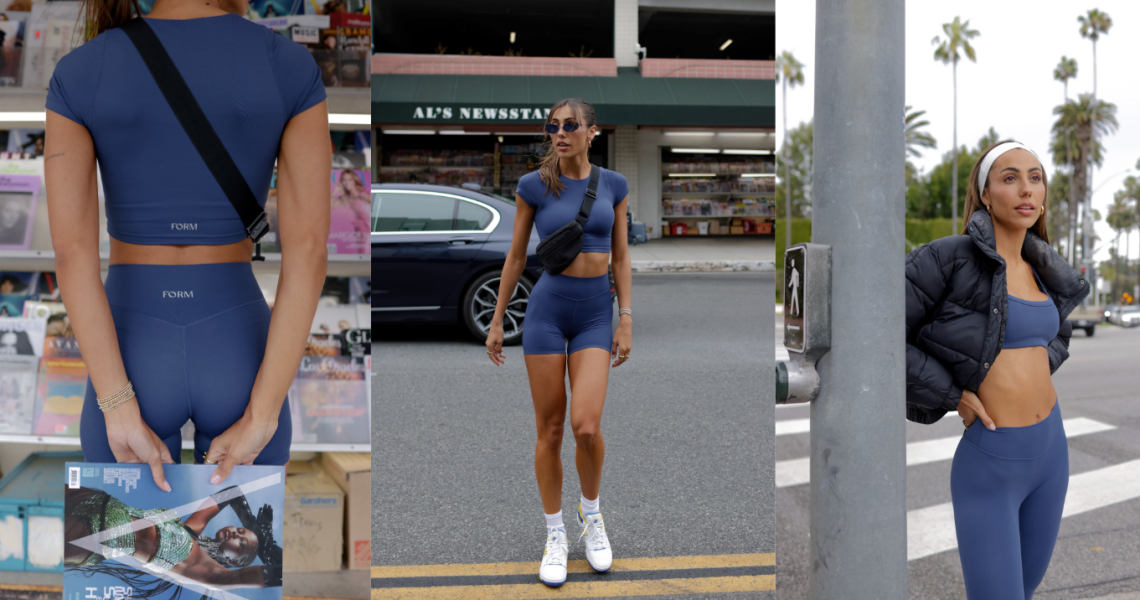On Monday, July 11, Sami Bernstein was at Equinox in Austin when three women in their 20s stopped her at the smoothie bar. “Oh, my God. You already got the Form leggings?” they asked, not realizing that Bernstein is a partner in the business. She was wearing the brand’s black bra-and-leggings set, which had launched — and sold out — on July 3. It is only identifiable by a small logo on the back of each item. “I was like, ‘Oh, my God. Feel them. You totally need them.’ And they were just freaking out about how soft they were,” she said.
Bernstein is the co-founder of Form, a digital fitness and wellness app. She often goes by Bernie, because her co-founder and the face of the brand is also named Sami. That’s Sami Clarke, the fitness instructor who’s amassed 588,000 followers on Instagram and 377,000 on TikTok.
Clarke, an International Sports Sciences Association-certified trainer and former model, ramped up her sharing of fitness content on YouTube and Instagram during the pandemic. She focused on shorter workouts, primarily HIIT and strength training. And she emphasized the convenience of working out from home and the importance of moving and connecting to one’s body, rather than working out for hours on end. “I was pretty much training girls for free on Instagram Lives five times a week,” she said. And it worked to build her community.
Clarke and Bernstein met through their partners and immediately hit it off. Bernstein’s background was in influencer marketing. “I would give Sami advice as she was one of my new friends who I wanted to see [become] extremely successful. I knew she was building something that the world needed. … [Soon] I was offering to go into business with her, because it just felt right. And we never looked back,” she said. They moved off of social media and launched the app in August 2021. The workouts are accessible, for $22 a month or $120 a year. The founders declined to share the company’s member count, but said that it grew 30% from May to June. Its press materials also state that it acquired “thousands” of members within 24 hours of launching.
Clarke’s community has continued to inform what she does and how Form grows and expands. For example, the “mat pilates” class came from “a big ask from the community,” she said.
The app also offers recipes and meal plans, seeking to offer its community a holistic wellness lifestyle. Whenever the company introduces something new, it first teases it on social media, asking followers to guess what it may be. “[They] always [guess] activewear,” Bernstein said. “They wanted to live in Form, not just do the workouts.” She noted that the creation of the first collection took a year and a half.
The collection launched with two bra tops, one cropped T-shirt, a pair of shorts and a pair of leggings, priced $46-$72. They come in trend-forward neutral shades including sage green and brown. “We don’t want the loud patterns; that isn’t us,” Bernstein said. To produce the collection, the brand made one full-time hire and linked with two external teams.
The collection’s point of difference comes down to the fabric, Bernstein said — notable, given that most customers shopped the collection online without having felt the product for themselves. The fabric is 82% nylon and 18% spandex. According to Clarke, it feels like something you want to live in all day, without “sacrificing the smoothing compression needed for your daily movement.”
Prior to the launch of the collection, the company sold just a few items, including a wellness journal. It plans to release new collections four times a year.
Form hosts monthly community walks in L.A. For the walk in July, its employees wore the apparel collection, giving participants an early preview of the goods. On its launch day, “first-time customers spent over $400 buying their size in every single color and style,” Bernstein said.




